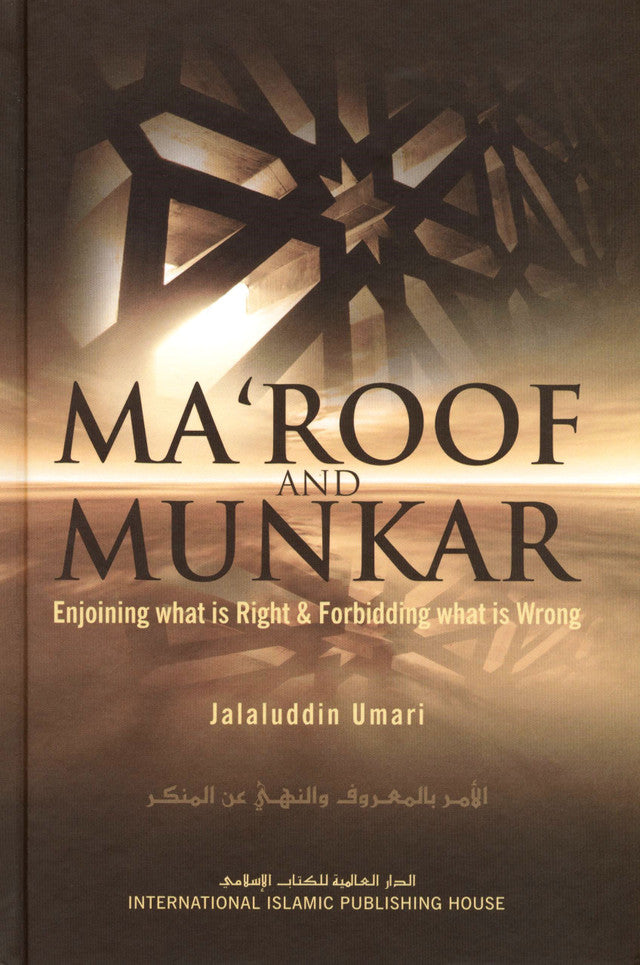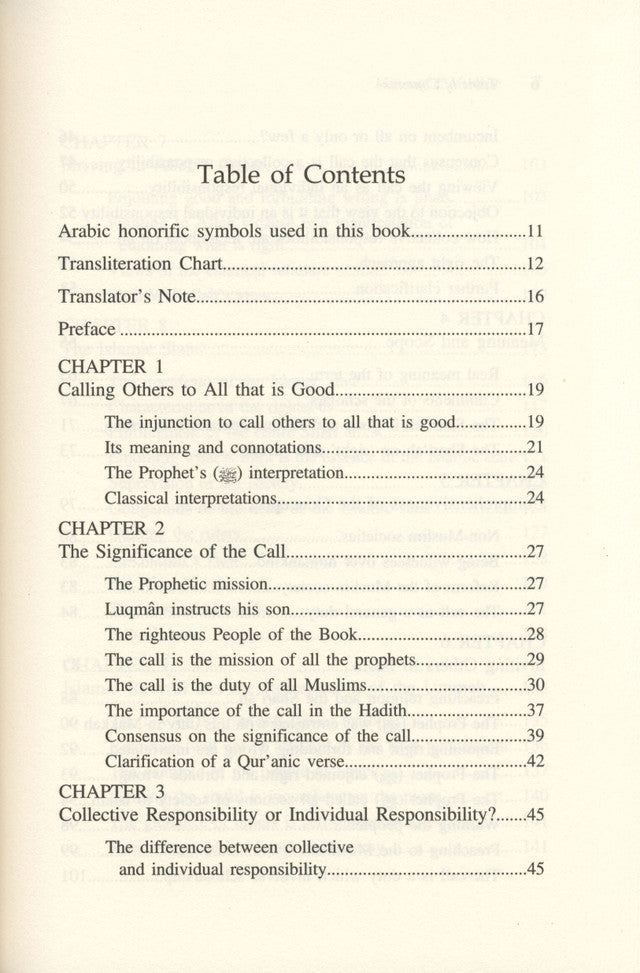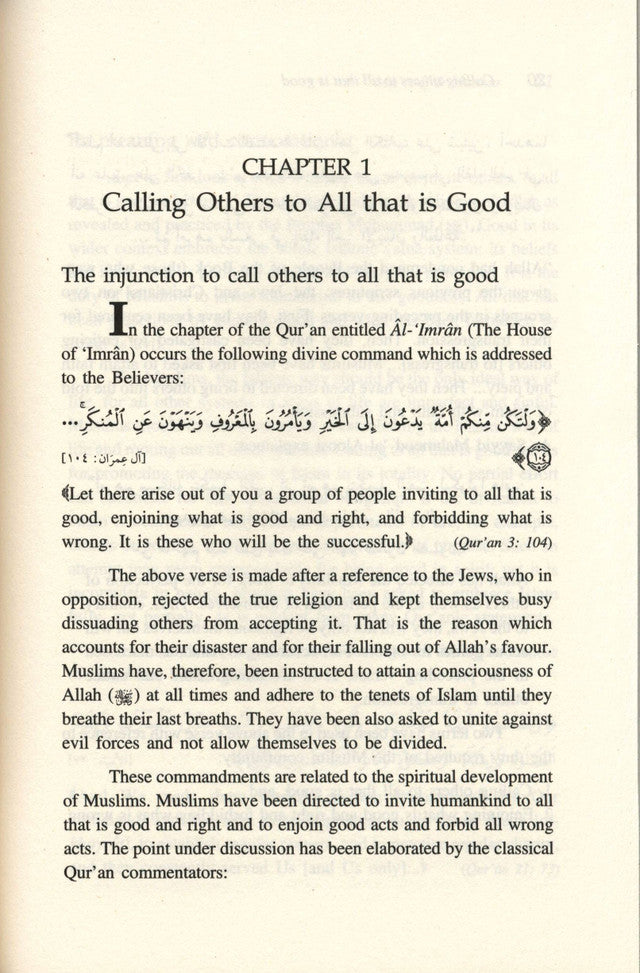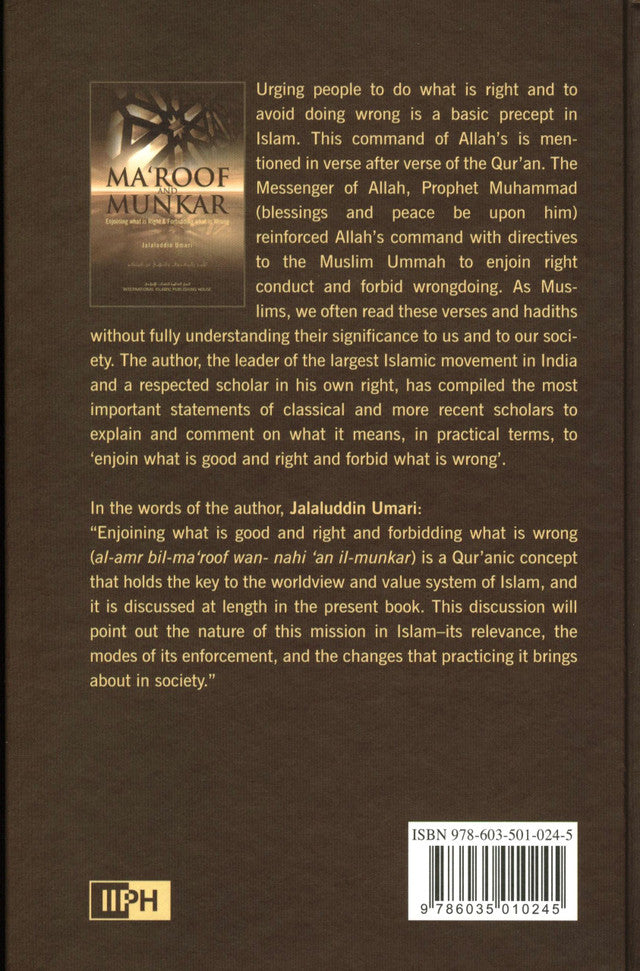Maroof and Munkar by Jalaludin Umari
Maroof and Munkar by Jalaludin Umari
Publisher:
IIPH (International Islamic Publishing House)
Language:
English
Binding:
Hard Cover
Pages: 270
Size: 16x21cm
Couldn't load pickup availability




Collapsible content
Description of Book
Maroof and Munkar by Jalaludin Umari
Publisher
IIPH (International Islamic Publishing House)
Author
Sample Pages - Content
PAGE NO :1
MA'ROOF
AND
MUNKAR
Enjoining what is Right & Forbidding what is Wrong
Jalaluddin Umari
INTERNATIONAL ISLAMIC PUBLISHING HOUSE
PAGE NO :2
Table of Contents
Arabic honorific symbols used in this book....
Transliteration Chart
Translator's Note
Preface.
CHAPTER 1
Calling Others to All that is Good
The injunction to call others to all that is good.
Its meaning and connotations
The Prophet's() interpretation
Classical interpretation.
CHAPTER 2
The Significance of the Call..
The Prophetic mission..
Luqmân instructs his son.
The righteous People of the Book..
The call is the mission of all the prophets. The call is the duty of all Muslim. The importance of the call in the Hadith.. Consensus on the significance of the call... Clarification of a Qur'anic verse.
CHAPTER 3
Collective Responsibility or Individual Responsibility?.
The difference between collective
for and individual responsibility
PAGE NO :3
CHAPTER 1
Calling Others to All that is Good
The injunction to call others to all that is good
In the chapter of the Qur'an entitled Âl-'Imrân (The House
of 'Imrân) occurs the following divine command which is addressed to the Believers:
وَلْتَكُن مِّنكُمْ أُمَّةٌ يَدْعُونَ إِلَى الْخَيْرِ وَيَأْمُرُونَ بِالْمَعْرُوفِ وَيَنْهَوْنَ عَنِ الْمُنكَرِ ...
[آل عمران : ١٠٤]
Let there arise out of you a group of people inviting to all that is good, enjoining what is good and right, and forbidding what is wrong. It is these who will be the successful.) (Qur'an 3: 104)
The above verse is made after a reference to the Jews, who in opposition, rejected the true religion and kept themselves busy dissuading others from accepting it. That is the reason which accounts for their disaster and for their falling out of Allah's favour. Muslims have, therefore, been instructed to attain a consciousness of Allah () at all times and adhere to the tenets of Islam until they breathe their last breaths. They have been also asked to unite against evil forces and not allow themselves to be divided.
These commandments are related to the spiritual development of Muslims. Muslims have been directed to invite humankind to all that is good and right and to enjoin good acts and forbid all wrong acts. The point under discussion has been elaborated by the classical Qur'an commentators:
PAGE NO :4
MA'ROOF MUNKAR
Urging people to do what is right and to avoid doing wrong is a basic precept in Islam. This command of Allah's is men- tioned in verse after verse of the Qur'an. The Messenger of Allah, Prophet Muhammad (blessings and peace be upon him) reinforced Allah's command with directives to the Muslim Ummah to enjoin right conduct and forbid wrongdoing. As Mus- lims, we often read these verses and hadiths without fully understanding their significance to us and to our soci- ety. The author, the leader of the largest Islamic movement in India and a respected scholar in his own right, has compiled the most important statements of classical and more recent scholars to explain and comment on what it means, in practical terms, to 'enjoin what is good and right and forbid what is wrong'.
In the words of the author, Jalaluddin Umari:
"Enjoining what is good and right and forbidding what is wrong (al-amr bil-ma'roof wan- nahi 'an il-munkar) is a Qur'anic concept that holds the key to the worldview and value system of Islam, and it is discussed at length in the present book. This discussion will point out the nature of this mission in Islam-its relevance, the modes of its enforcement, and the changes that practicing it brings about in society."
IIPH
Jalaludin Umari
Maulana Jalaluddin Umri was a highly influential Indian Muslim scholar, multi‑lingual author, and long-serving leader within Jamaat‑e‑Islami Hind, remembered for his contributions to Islamic thought, education, and community welfare.




